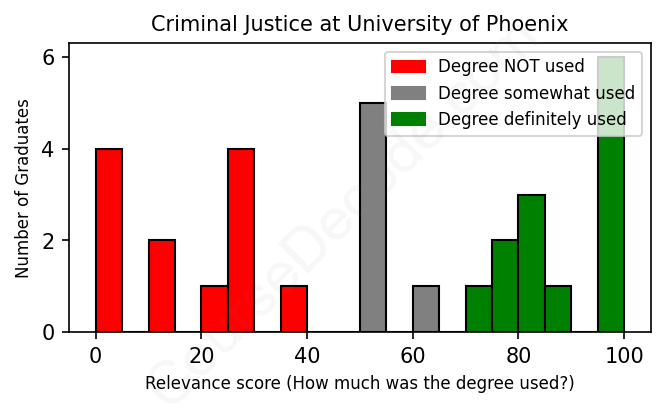
First, some facts. Of the Criminal Justice graduates from University of Phoenix we've analyzed , here's how many have used (or NOT used) their degree in their career:

These are estimates based on AI analysis of 31 LinkedIn profiles (see below).
The verdict? Significantly below average. Overall, with an average relevance score of 53%, Criminal Justice graduates from University of Phoenix have a much lower likelihood (-14%) of finding work in this field compared to the average graduate across all fields:
And for comparison, here's the chart for all profiles we've looked at across all degrees.
Also, after graduating, 48% of these graduates have pursued further education other than another Bachelor's degree (such as a Masters degree or other), compared to the average across all profiles of 35%. This suggests you may need more than just a Bachelors degree to be competitive as a Criminal Justice graduate.
See the details:
|
Relevance score: 27% We think this person has NOT gone into a career related to their degree. We think this person has NOT gone into a career related to their degree.
DEGREE INFOGraduated in 2018 from University of Phoenix with a Bachelor of Science - BS in Criminal Justice. No other secondary education since. JOB HISTORY SINCE GRADUATIONStation Trainer Unifi Alaska Nov 2019 - Oct 2023 Performance Manager  Unifi Aviation Nov 2019 - Present ABOUTNo information provided. |
The top 10 most common jobs done by the graduates we've analyzed (ranked most common to least) are:
Based on the job profiles of individuals who graduated with a Criminal Justice degree from the University of Phoenix, it seems that there’s a mixed bag of job relevance to the field. Some of the most common positions include roles like attorneys, marriage and family therapists, and various positions in public safety and corrections, which clearly show a strong connection to criminal justice principles. For example, attorneys and therapists require a solid understanding of legal and ethical issues, and roles such as Public Safety Dispatcher and Correction Officer are directly tied to law enforcement practices and community safety.
However, there are also a lot of jobs that don’t directly pertain to criminal justice. Positions like supply clerks, brand ambassadors, and various managerial roles in industries unrelated to law enforcement illustrate a trend where graduates are not exclusively working in fields aligned with their degree. Many roles focus on administrative tasks, marketing, or general management, which don’t leverage the specific knowledge gained from a Criminal Justice program. Overall, while some graduates find themselves in highly relevant positions, a significant number end up in roles that bear little connection to their studies, suggesting that having a degree in Criminal Justice does not guarantee a career in the field.
Here is a visual representation of the most common words in job titles for Criminal Justice graduates (this is across all Criminal Justice graduates we've analyzed, not just those who went to University of Phoenix):

So, looking at the career paths of people who graduated with a Criminal Justice degree from the University of Phoenix, it seems there’s a mix of outcomes, and it really depends on the individual’s interests and choices. For many graduates, their initial jobs right after finishing school are often in related fields, like dispatching for 911 services, roles in correction facilities, or even positions as case workers and therapists. These first jobs indicate that a fair number of them are kicking off their careers in direct criminal justice or human services roles, which is pretty promising. However, as time goes on—like five to ten years later—some of these individuals have diverged significantly. You’ll see some moving away from the criminal justice path entirely into fields like real estate or security management, while others stick closely to their roots, progressing into higher roles like attorneys, therapists, or even leadership positions within law enforcement.
On the flip side, not all graduates seem to have found their niche in criminal justice after graduation. There are also quite a few who appear to be in jobs that might not directly relate to their degree, like managers in various sectors or those in sales and administrative roles. It’s a mixed bag, honestly—some have done really well and carved out successful careers within the realm of criminal justice or related fields, while others seem to have taken quite a different route. If you’re considering a degree in this area, it’s a good idea to think about what kind of job you see yourself in and how committed you are to staying within that field over time.
Honestly, getting a Bachelor’s degree in Criminal Justice at the University of Phoenix is generally considered to be on the easier side compared to some more rigorous programs. The coursework is designed to be accessible, with a lot of emphasis on practical knowledge rather than heavy theory. You’ll still have to put in effort, especially with reading and understanding laws and ethics, but overall, the program tends to be manageable for most students, especially if you’re organized and stay on top of assignments. Plus, the online format gives you some flexibility, which can definitely help balance your studies with other commitments. So, if you're interested in Criminal Justice, it’s a pretty straightforward path to follow!
Most commonly, in the LinkedIn profiles we've looked at, it takes people 4 years to finish a Bachelor degree in Criminal Justice.
So, when you look at the career paths of these University of Phoenix Criminal Justice grads, it really varies when it comes to money. Some of them, like the attorney and the licensed marriage and family therapists, probably earn pretty decent salaries, especially after they’ve built some experience and clientele. Others are working jobs in fields like security and administrative roles, which might not pay as much. Overall, it seems like a mixed bag—some are really climbing the ladder and probably making good money, while others might be starting out a bit lower on the pay scale. It really depends on the specific job and the level of experience they have, but it looks like there are definitely opportunities to make decent money in this field!
Here is a visual representation of the most common words seen in the "about" section of LinkedIn profiles who have a Bachelor degree in Criminal Justice (this is across all Criminal Justice graduates we've analyzed, not just those who went to University of Phoenix). This may or may not be useful:

Here are all colleges offering a Bachelor degree in Criminal Justice (ordered by the average relevance score of their Criminal Justice graduates, best to worst) where we have analyzed at least 10 of their graduates: